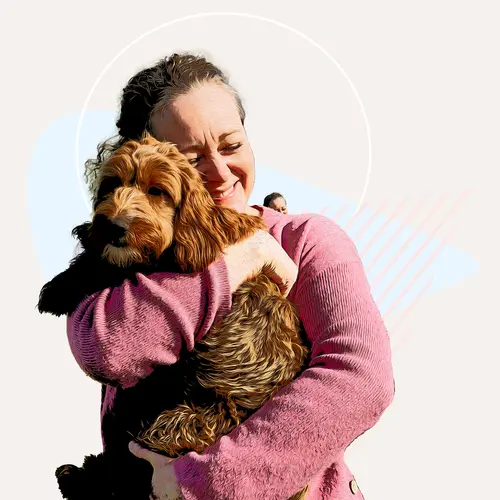From chewies to dental bones to dental diets, what makes the biggest difference for your dog’s teeth, gums, and breath? Should you even be concerned about your dog’s oral health?
Yes. Dogs can suffer from gum (periodontal) disease just like people, and it’s not something to ignore. Dental problems in dogs can lead to loss of appetite and broken or lost teeth, and it may even damage other organs if bacteria get into the bloodstream through diseased gums.
Professional cleanings and brushing your dog's teeth are great ways to maintain oral health. Dog dental treats and special diets also may provide some oral benefits, but using them comes with precautions.
The Benefits of Dog Dental Treats
Just as with humans, dogs can suffer from oral problems like:
- Bad breath
- Build-up of saliva, bacteria, and food on teeth (plaque)
- A hard yellow or brown residue on teeth (tartar)
- Swollen, bleeding, or irritated gums
- Pain
Improving teeth and gum health. Dogs that chew actively have less plaque build-up. And some types of dog dental treats and diets can reduce plaque by nearly 70%. How do they do this? Simply the mechanical action of chewing can make a difference. In one study, increasing the diameter of kibble by 50% led to a 42% reduction in tartar. In the same study, coating the products with a substance called polyphosphate further reduced tartar by 55%.
The Veterinary Oral Health Council (VOHC) is an organization that evaluates pet products to see if they meet standards for reducing plaque or tartar. Approved foods, treats, and chews must reduce plaque or tartar by at least 10% to achieve the VOHC seal of approval. If a chemical anti-plaque agent is used, it needs to reduce plaque or tartar by at least 20%. Go to https://www.vohc.org/accepted_products.htm to see which products have received the VOHC seal of approval.
Reducing bad breath in dogs. It is not uncommon for a dog’s breath to be slightly unpleasant. This is often the result of bacteria build-up in the mouth and can be a sign that your dog needs better dental or gum care. However, it’s not a bad idea to check with your vet to make sure bad breath is not a sign of an underlying medical problem.
In addition to professional cleaning and regular tooth brushing, certain dog treats are also formulated to help improve breath. Hard chew toys may also help. See what your vet recommends.
Types of Dog Dental Treats and Diets
A wide variety of dog dental treats and diets make claims of reducing plaque and tartar or improving breath. Some have voluntarily been tested and received the VOHC seal of approval. Most are available in stores, but some you can only purchase through veterinarians. Here are the main types:
- Rawhide chews. Made from the hides of cows or horses, rawhide chews can reduce plaque and tartar. They come in different sizes and shapes.
- Dental chews, bones, and biscuits. Greenies®, Del Monte Tartar Check® Dog Biscuits, Bright Bites, OraVet® Dental Hygiene Chews, and Vetradent Dog Chews are examples of edible products approved by the VOHC.
- Dog dental diets. Some dog food formulations help reduce plaque and tartar. They do this in a variety of ways. Some are made into larger kibble or a texture that resists crumbling, which creates a scrubbing action. Others have a special coating that helps prevent bacteria, reduce plaque, or discourage the formation of tartar. Ask your vet about these and special dental diets available only through the veterinary market.
Dog chew toys. Although not edible, chew toys such as Kong® toys, Plaque Attackers®, or Gumabones® may be a good choice, especially for dogs that chew through edible treats too quickly.
Taking Precautions with Dental Dog Treats
Not all dental dog treats are created equal. Some are more effective or safe than others. Here are a few things to keep in mind as you’re choosing a dental treat for your dog:
Make the right match. Match the treat or toy to your dog’s size, preferences, or personality. For example, aggressive chewers may need a product that is firmer.
Limit edible treats. Depending on the type of edible treat, it may go down too fast to be of much benefit to your dog’s teeth. And these treats can quickly add lots of calories. The general rule is the smaller the dog, the fewer the treats. Ask your vet if you have questions about this.
Avoid hard bones and pigs’ ears. If your dog has diseased teeth, they are likely to break them on hard chews, hard plastic bones, sterilized beef bones, or cow hooves. Do not give your dog fresh bones with meat and cartilage because of the risk of bacterial contamination or ingestion of sharp bone fragments by aggressive chewers.
Although pigs’ ears are often a favorite of dogs, studies have not shown them to offer any dental benefits. They are also sometimes contaminated with bacteria.
Be careful with compressed chews. Edible treats such as rawhide chews can help with dental health. But some dogs, especially aggressive chewers, consume them too quickly or may swallow pieces whole. This can cause choking or blockages. These products may also be contaminated or cause stomach irritation. Watch your dog while they are consuming these products. If your dog swallows a large chunk, contact your vet. And watch for signs of intestinal upset. Be sure to limit how much your dog - especially a smaller dog - consumes at one time.

